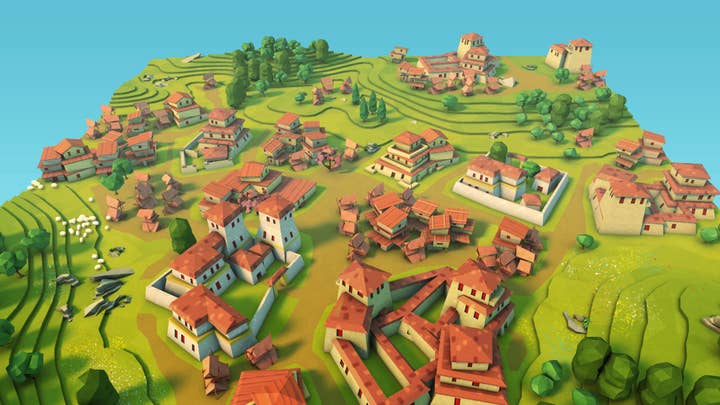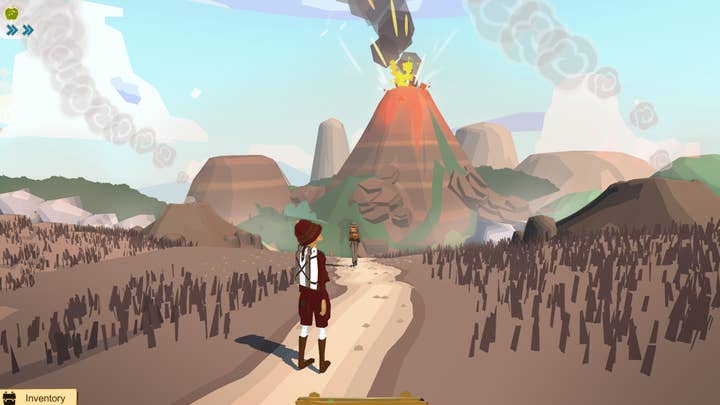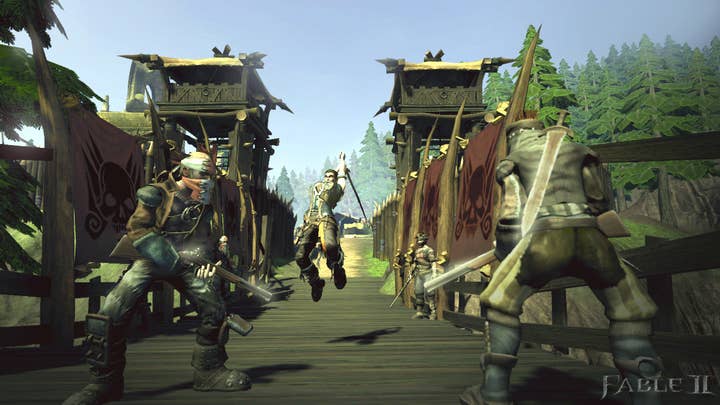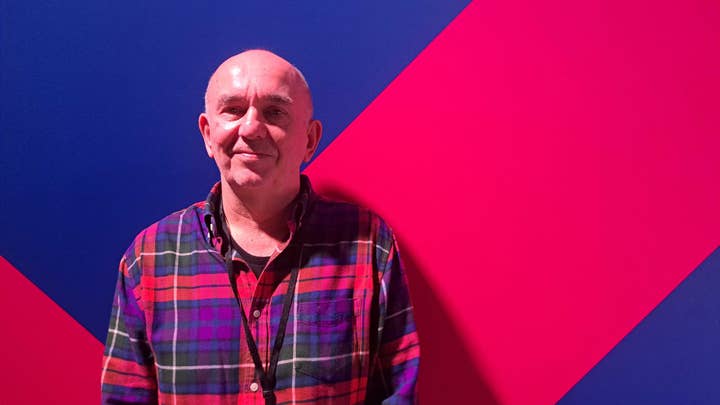Peter Molyneux is returning to his roots
Veteran and sometimes controversial game developer on his return to PC and console, and countering the notion that everything he says is a promise
Sign up for the GI Daily here to get the biggest news straight to your inbox
2023 marks ten years since Peter Molyneux's social experiment with Curiosity: What's Inside The Cube concluded, promising one user a direct role in strategy game Godus as the 'God of Gods.'
In the following years, a Eurogamer interview with that player, Bryan Henderson, and a controversial interview with Rock Paper Shotgun prompted a lot of negativity towards Molyneux, and compelled him to take more of a backseat, handing over the reins of his studio 22cans and resolving not to speak to the press.
2023 also marks Molyneux's tentative return to the spotlight, with a handful of interviews earlier this year, then as a guest on Simon Parkin's My Perfect Console podcast, and appearing at last week's EGX 2023 to reflect on Fable 2's 15th anniversary. In the narrow window between his arrival at London's Excel Centre and walking out on stage, Molyneux spoke to GamesIndustry.biz about what he's been doing in the intervening decade.
"It's interesting because ten years ago the press used to take up an enormous amount of my time," he says. "I would say three days of a five-day week had some sort of press that was going on and then suddenly, just like that, it stopped. I thought, 'What am I going to do?' And what I decided to do was return to being a coder. So I've been working on my code for a long time, and that's a lot more [like] where I started from. I started as a coder rather than a designer. And, I'm absolutely adoring it. I love it, but it does make me a lot more introverted."
As he previously expressed on Parkin's podcast, Molyneux acknowledges some of the issues with how he communicated about his games to the press in the past, from the infamous Fable acorn (implying that players would be able to plant an acorn in-game and watch it grow into an oak tree, an idea that never came to pass) to the Godus debacle.
"[My blog is] trying to counter the whole notion that everything I say is a promise that's going to be broken"
When asked how he would approach these scenarios differently, he says: "Hindsight's hindsight, but if I invested all my time in a great time machine, I would go back and I would say, in Curiosity's sake, what was inside the cube. That was me being insanely naive. It was thinking that if I just say there's something mysterious inside the cube, then is that going to be more motivating than saying what it is? So, that's the first thing.
"Secondly, I would never have said anything about acorns and oak trees in the Fable world. And thirdly, I would never have gone on Kickstarter. That was absolutely disastrous."
When we press on the lack of communication and ultimate disappointment for Bryan Henderson, Molyneux says he thinks the commitment towards Henderson was "honoured."
"We didn't shout about it in the press. We just honoured it, but I think it would have been my 'get out of jail free card' with Curiosity if I'd said, 'right, here's what's in the centre and it's up to you to get there'."
Focusing on his work today, Molyneux and his team of 23 people at 22cans are currently split between four projects. There's a new update for Godus in the works that will expand the gameplay from a ground level and into the sky, plus this week's latest maintenance update for The Trail.
Next month will see the launch of the studio's play-to-earn blockchain title Legacy, and beyond that the team has just begun work on a new game, codenamed MOAT, set in the world of Albion (which also inspired the setting of Molyneux's acclaimed Fable series).
"That's a hell of a lot of work for 23 people," he laughs.

If you're surprised Godus is still around following the controversy over its deity, you're not alone. Press coverage around the mobile title has been minimal, but Molyneux says that the game has been "performing really well."
"We're really proud that for the last five months it's been featured by Apple. So it's doing really well on iOS and really well on Android. And that's all credit to the team – [game director] Jody Sherry, who's heading up that team, has been doing a fantastic job of just listening to the community and giving them what they want, and slowly and organically it's growing.
"The remarkable thing about Godus is we've never done any advertising for it. This is just all viral word of mouth and featuring on Apple, which is fantastic. The thing is, these days, as you know, you never finish a game. You just release these kind of updates that are going on. So what Godus is now compared to when it was when it was launched is very, very different."
"I started as a coder rather than a designer. And [now I'm coding again], I'm absolutely adoring it"
That's a stark contrast compared to the games Molyneux worked on before moving into mobile. From the beginning of his career, right through his work at Xbox's Lionhead Studios, the long-running developer was more accustomed to games that are largely finished and released, perhaps with some day one patching. During his Fable 2 on-stage retrospective at EGX, he mentioned how much of Fable 3's shortcomings came down to having a development window of just 18 months and needing to ship the game on time.
So how does working on live service games, where new features can be added years after launch, compare?
"I'll be absolutely honest, I find it intensely aggravating," he tells us. "When we used to finish games of the past, you used to send the gold disc off and that was it, big relief. And you used to go away on holiday, or celebrate in the local greasy spoon cafe. You don't have that anymore."
This is one of the key reasons why Molyneux and the 22cans team is now working on MOAT, which is targeting PC and consoles with no plans for a mobile version. Molyneux doesn't share any details about the game beyond the setting, but suggests he is looking forward to working on something that has a defined beginning, middle, and end.
"That's the problem with ongoing development, especially around mobile – there is no end. There's no story. You might have a little story arc, but there's no end. And that's one of the refreshing things about working on PC and console, because you can say, 'right, we want to entertain someone for 30, 40, 50 hours, however long it is, and that's it'."

You'd be forgiven for thinking Molyneux would have embraced live service development, since it offers more leeway to revisit features and ideas that might be cut due to time or resource constraints. Surely, acorns that grow into oak trees could be patched into a live-service Fable, for example?
"I think there's benefits to both," he says. "And normally when you're thinking through and designing something that's really open-ended, you can kind of explore a little idea and say, 'Right, that will be update No.1, that will be update No.2,' which is nice.
"But I don't think for me it outweighs the real kind of passion to tell this big story that has a poignant beginning, a memorable middle, and a really memorable end. I'd rather sacrifice the freedom of putting features in and throwing them out for that.
"I haven't got an infinite number of games left in me, and I really wanted to return to my roots"
"Because the problem with the live update stuff is you're never sure where your audience is. You're not sure whether, if someone downloads an update, they are at the starting point of the game or the ending point. You get a very fragmented audience. But it's nice that 22cans is doing both now."
The 64-year-old developer tells us the reason he decided to veer back towards traditional platforms is he's becoming increasingly conscious of time.
"I haven't got an infinite number of games left in me, and I really wanted to return to my roots," he explains. "I've only got one game left in me probably [and] I've had this idea brewing around in my mind for a long time, so let's put all of my energy and effort into this last game."
Molyneux adds that MOAT is "far, far too complex for touch [controls]," observing that some games are better suited to console and PC.
"The trouble with a mobile device is the play sessions that people have are so short and fleeting, they don't get fully immersed. If you want to tell a poignant story, or have game mechanics that people have never experienced before, it's quite a long experience to teach them that.
"If you just look at my phone, I've got 20 games that I can play. If I don't want to play one any more, I just move to the next one. The great thing about PC and console is that someone's invested in buying the product."

As work progresses on MOAT, Molyneux will be updating followers via a blog exploring his process throughout development. The aim is to make this a more comprehensive but also more cautious approach to communicating his plans.
"Before, I'd sit with you and say I'm working on a new game, it's called MOAT, it's blah, blah, blah, blah, blah. And it would be like three or four sentences to try and get you excited. I think that is irresponsible in today's world.
"Today, every sentence, every word is analysed and broken down and people say, 'Well, the game must be this and the game must be that.' But the journey of an idea from the first moment of thinking 'Wouldn't it be cool to do a game about something?' to actually getting the game into production is a very long and involved journey.
"I used to love exploring ideas with people before a game was finished, and that was my kind of trademark but it got me into a lot of trouble. With the blog, I really want to explain that these things aren't just… you don't shoot from the hip, you know. They're long, considered and, you know, dare I say, quite interesting journeys that you have to go on. Really, it's trying to counter the whole notion that everything I say is a promise that's going to be broken."
Sign up for the GI Daily here to get the biggest news straight to your inbox

